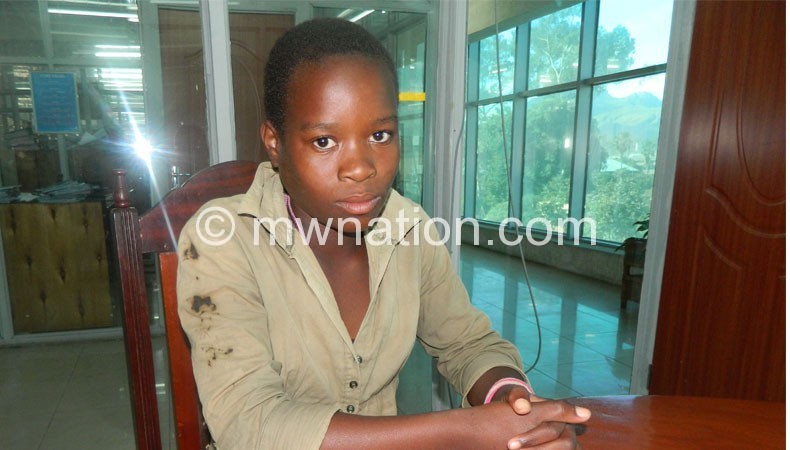Court imprisons 13-year-old girl
A magistrate court in Thyolo convicted a 13-year-old Noria Phiri from Ndalama Village T/A Nanseta in Thyolo and sent her to Chichiri Prison in Blantyre to serve a 30-day jail sentence after she failed to pay a K4 000 (US$9) fine for a rogue and vagabond offence.
The conviction and sentencing of the minor ruffled feathers of two non-governmental organisations—local and international—that condemned and described the manner in which the case was handled as a miscarriage of justice.
The Judiciary has also thrown its weight in support of the two civil society groups, describing the conviction and sentencing of the minor, and her committal to Chichiri Prison, as excessive.

The Malawi Law Society (MLS), on the other hand, has said the law generally abhors the detention of children in places where they are likely to come into contact with adult offenders.
Authorities at Chichiri Prison, according to Centre for Human Rights Education, Advice and Assistance (Chreaa), declined to jail the child on grounds that the prison is for adults only and referred her to Mpemba Reformatory Centre.
Chreaa has said it was, actually, a mistake for Mpemba Reformatory Centre to accept to keep the child using a committal to prison the court in Thyolo issued and not an order from a Child Justice Court.
A week after her stay at Mpemba, a Catholic oganisation based at St Pius Parish in Blantyre—Chifundo-Chilungamo-Chitukuko Trust (CCCT)—rescued the girl by paying the fine.
Among other objectives, CCC Trust works with prison authorities in ensuring that prisoners do not lose their dignity as human beings. The organisation also has keen interest in ensuring that less-privileged suspects are accorded fair trial.
After payment of the fine and obtaining the receipt from Thyolo magistrate court last Wednesday, Chreaa rushed to Mpemba to secure freedom of the girl.
Norah’s story, in an interview after her release, was brief: “I stay at Luchenza. I was going to a shop to buy Fanta with a friend around 7pm [on June 2 2015]. As we were passing by a bar, we met police and they arrested us. They drove us to their station.
“We were locked up for a night at Luchenza Police. The following morning we were asked to sweep around the station and mop, which we did, and then we were taken to Thyolo [magistrate] for court.
“We were fined K4 000. They said if we failed to pay, we were going to prison [for 30 days]. My friend was bailed out but I had no one to pay for me and I was taken to Chichiri Prison. At Chichiri, they said I was too young to be kept there and I was referred to Mpemba.”
Judiciary spokesperson Mlenga Mvula said on Wednesday that the duty of the Judiciary is to interpret the law and judges and magistrates are at all times required to ensure that they are within their jurisdiction.
Mvula said it was a mistake to commit a 13-year-old to Chichiri Prison for a rogue and vagabond offence.
“The offence itself is vague and misdemeanor as police have often times applied it wrongly. The court should have dealt with the girl differently, and not sending her to a prison of adults,” said Mvula.
MLS secretary Khumbo Soko said where courts are dealing with offending children, it is important that an inquiry be made as to the means of the child and his or her parents or guardians so that the fine imposed are actually payable.
“There is a need for the country to have a robust debate on the propriety of maintaining vagrancy laws on our statute books. As our courts have said time and again, it should not really be a crime for one to even aimlessly wander about at night, provided they are up to no mischief,” said Soko.
Added Soko: “Our Constitution guarantees the right to freedom to movement and there is a case to be made that the limitation that these laws impose on this right is neither reasonable nor necessary and that it might not meet international human rights standards.”
He said there is also the challenge of selective enforcement as the laws would invariably target those who are indigent.
Chreaa and the Southern Africa Litigation Centre (Salc) have said they are deeply concerned and saddened by the ongoing non-compliance by some magistrate courts with some of the provisions of the Child Care, Protection and Justice Act of 2010.
Mhango said: “In terms of Section 140 of the Child Care, Protection and Justice Act, a child cannot be imprisoned for any offence. However, some magistrate courts continue to unlawfully preside over cases of children and pass sentences of imprisonment on such children, even in the case of minor offences such as being a rogue and vagabond.
Mhango said currently there are only two reformatory centres in Malawi—Chilwa in Zomba, and Mpemba in Blantyre.
He said they note with concern that some magistrate courts are detaining children in prisons, especially at Bvumbwe Prison in Thyolo and at Kachere Prison in Lilongwe.






this is absolutely ridiculous why? and why? 4000 mwk? seriously? hahahaha this is a joke!
What was the evidence in court? Judge the judgment with respect to what went on in court.